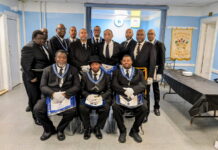
A photo of the Cross County Shopping Center in the 1950’s
By Mary Hoar, City of Yonkers Historian, President Emerita Yonkers Historical Society, recipient of the 2004 Key to History, Member of the Yonkers Landmarks Preservation Board, and President Untermyer Performing Arts Council
Monday, May 13th:
May 13, 1921: Keeping a promise, Mayor William Wallin appointed Yonkers’ first two women Justices of the Peace! He announced weeks earlier he would appoint women experienced in welfare or legal aid work as Justices of the Peace, believing they would do much good for the poor. Florence Parsons, General Secretary of the Woman’s institute, and Dee Griswald Atkinson were to fill the vacancies.
Parsons co-founded the Civic League with Mary Marshall Butler, was a Director of Yonkers Charity Organization Society, and studied Philanthropy in the (NY) School of Social Work.
Besides having a background in business, Atkinson was Regional Director of the Immigration Division of State Ed, and taught Americanization skills to foreign women. She was State Director of the DAR Americanization program, and a state Director of the American Red Cross.
Tuesday, May 14th
May 14, 1932: Mile Square Road’s Martha Jones opened the Yonkers office of the “Repeal Week” movement at 15 North Broadway; the movement was part of the national mobilization of women who wanted Prohibition repealed.
May 14, 1946: Saunders students, unhappy because electrical classes were consolidated, formed a picket line outside of the school on South Broadway. Principal Patrick
McHugh explained it was so close to the end of the school year, he had a “problem getting teachers for electrical courses.” He merged tenth-grade classes into one class, and eleventh-grade classes into a second course. This consolidation forced some students to drop electrical studies. When the leaders of the strike tried to meet with McHugh, they were told to “return to class or there would be a court decision.”
Wednesday, May 15th
May 15, 1924: According to The Yonkers Herald, the Common Council and the Board of Estimate went out of existence. They were to be replaced by a Municipal Assembly, an Upper House (Board of Estimate) and a Lower House (Common Council), following the Home Rule Act passed by the NY State Legislature.
Mayor Wiesendanger met with the Corporation Council Daniel Cashin and City Clerk John Kettell to determine new protocols and procedures; they concluded they couldn’t proceed with the conversion. The Legislation required the
Upper House, or the Board of Estimate, have five members; Yonkers’ Board only had three.
May 15, 1935: Ending a twenty-year fight for Sunday baseball, the Yonkers Common Council passed a law making it legal.
Thursday, May 16th
May 16, 1923: Captain Felix Reisenberg of Palisade Avenue was appointed Commander of the New York Nautical school and Captain of the Schoolship Newport!
Previously with the American Bureau of Shipping and Editor of “The Nautical Gazette,” he authored several technical books on seamanship. Today, New York Nautical School is the State University of New York Maritime College.
In 1907, Felix was navigator on the three-man airship America on its failed attempt to reach the North Pole by dirigible.
May 16, 1942: The Common Council gave permission to US Shipbuilding Corporation of Brooklyn to use 10 acres of city-owned land to construct buildings for a shipyard. The firm was to build all-welded vessels for the war effort and planned to hire at least 300 workers.
Friday, May 17th
May 17, 1924: After a lengthy morning meeting discussing the Yonkers Home Rule situation with W. P. Capes, Secretary of the State Conference of Mayors, Corporation Counsel Cashin, First Assistant Counsel Harry Laragh and other city officials, it was decided Yonkers couldn’t have a Municipal Assembly! Capes gave a lengthy explanation of the requirements and reminded them of all the “second class cities,” only Yonkers, Troy and Syracuse objected to an elected Board of Estimate. He pointed out other cities with a bicameral system of government phased it out as ineffective.
May 17, 1952: The Yonkers Main Street Post Office sent out an “in distress” signal! A staff member inadvertently flew its roof flag upside down, the distress signal used by ships in trouble, ships needing help. As soon as a Herald Statesman employee spotted the error, the notified the PO; it was immediately corrected.
Saturday, May 18th
May 18, 1948: Vice Mayor Jimmy Sullivan’s attorney Paul Bleakley and District Attorney George Fanelli gave their closing arguments, with Fanelli arguing Sullivan used the “dead men defense” since defense attorneys blamed the crime on people who were dead. County Judge Elbert Gallagher sent the jury to deliberate after 104 minutes of instruction on the jury’s responsibilities and duties to decide if Sullivan was guilty of the three charges of forgery. Fanelli argued Sullivan used the “dead men defense” as Sullivan’s attorneys blamed the crime on people who were dead.
After deliberating for about four hours, the jury came back with the verdict; the eight men and four women found Sullivan guilty on all three counts. He was convicted of signing the name “C. J. Arnold” to a Maritime Oil Company certificate; this “dummy company” was created to install phones at a bookmaking center.
Sunday, May 19th
May 19, 1923: Ten nurses graduated from St. Joseph’s Hospital Nursing School after three years of intensive coursework. Dr. George Mooney, head of the hospital’s medical staff, presided at the ceremony held in the Nurses’ Home; the main address was made by attorney Benjamin Moore.
May 19, 1952: The National Production Authority in Washington released steel and other materials needed to build the Cross-County Shopping Center. This was the last barrier for the multi-million-dollar development. Developer Cross Properties had materials for 50% of the project, but they had been turned them down for the remainder needed. Cross indicated there was no problem finding materials, as long as they had federal permission to get them.
Questions or comments on this column? Email YonkersHistory1646@gmail.com. For information on the Yonkers Historical Society, Sherwood House and upcoming events, please visit our website www.yonkershistoricalsociety.org, call 914-961-8940 or email info@yonkers.





